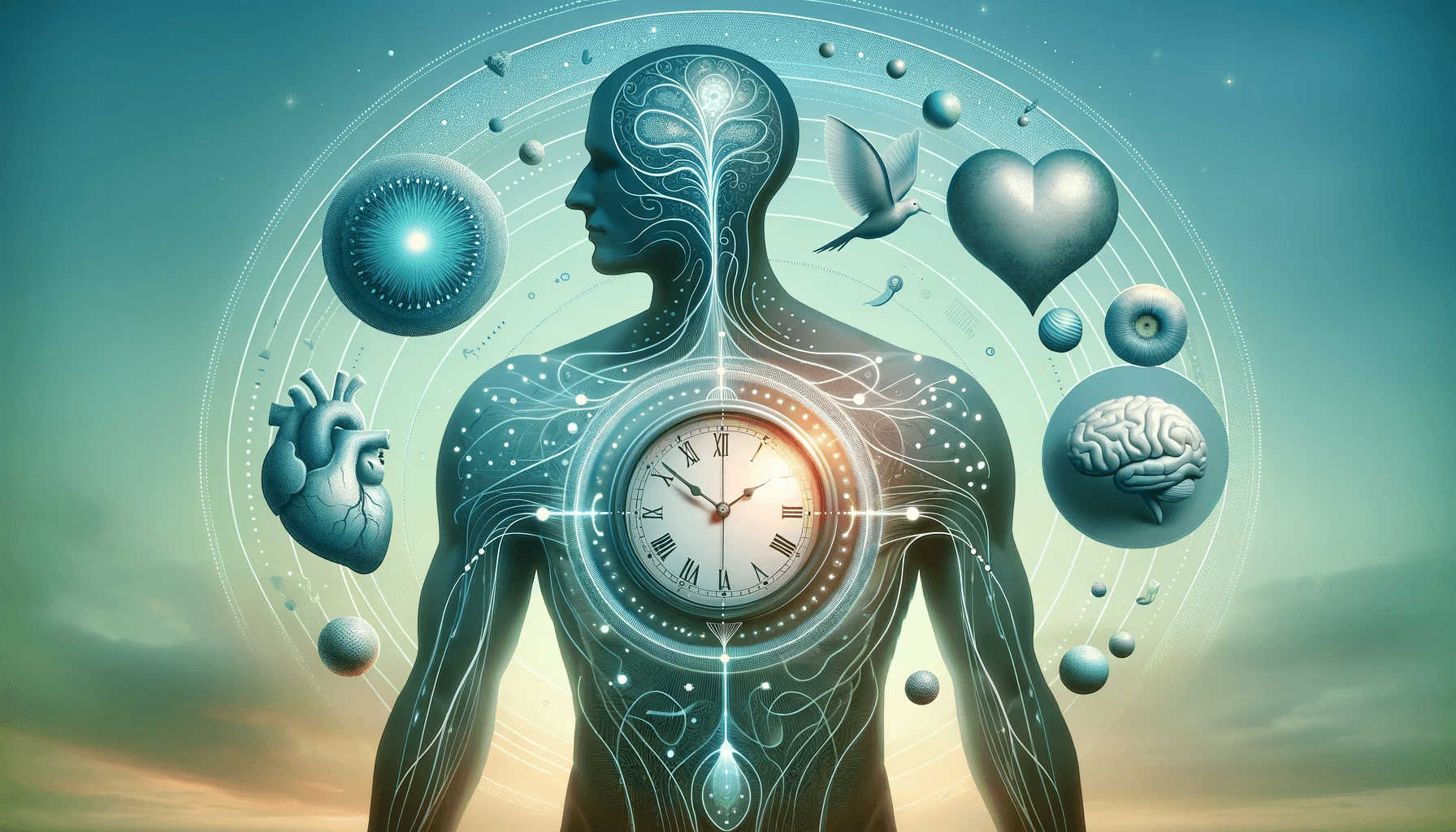Sponsored by The Wealth Compass
Table of Contents
Understanding the Body’s Internal Clock
Our bodies are complex systems that operate on a variety of intricate processes. One of the most fascinating aspects of our biology is the body’s internal clock, also known as the circadian rhythm. This internal clock plays a crucial role in regulating various bodily functions and significantly impacts our mental, emotional, and physical well-being.
The body’s internal clock is a 24-hour cycle that regulates our sleep-wake patterns, hormone production, body temperature, and other physiological processes. External cues, such as light exposure and daily routines, influence it. When our internal clock functions optimally, we experience a sense of balance and vitality. However, disruptions to this delicate system can have far-reaching consequences for our overall health.
The Importance of Circadian Rhythms
Circadian rhythms are essential for maintaining the body’s homeostasis and overall well-being. These rhythms, regulated by the body’s internal clock, help synchronize our physiological functions with the natural day and night cycles. When our internal clock is aligned with the natural light-dark cycle, our bodies are better able to perform vital functions such as digestion, cellular repair, and hormone regulation.
Research has shown that disruptions to circadian rhythms can lead to a wide range of health issues, including sleep disorders, mood disorders, metabolic disorders, and even an increased risk of chronic diseases such as diabetes and cardiovascular conditions. By understanding the importance of circadian rhythms and how they impact our mental, emotional, and physical health, we can optimize our internal clock and improve our overall well-being.
How the Body’s Internal Clock Affects Mental Health
Our mental health is closely tied to our body’s internal clock. When our circadian rhythms are disrupted, it can result in sleep disturbances, mood swings, and difficulty concentrating. Research has shown that individuals with irregular sleep-wake patterns are more likely to experience symptoms of anxiety and depression.
The body’s internal clock plays a vital role in regulating the production of neurotransmitters and hormones essential for maintaining stable moods and emotional well-being. Disruptions to this delicate balance can lead to serotonin, dopamine, and other neurotransmitter imbalances, contributing to mood disorders. By prioritizing healthy sleep habits and maintaining a consistent daily routine, we can support our body’s internal clock and promote better mental health.
The Connection Between the Body’s Internal Clock and Emotional Well-being
Our emotional well-being is intricately connected to the body’s internal clock. When our internal clock is disrupted, it can affect our emotional regulation, leading to increased irritability, mood swings, and a decreased ability to cope with stress. Sleep disturbances, which are often a result of circadian rhythm disruptions, have been associated with an increased risk of developing anxiety and mood disorders.
Additionally, research has shown that exposure to natural light is crucial in regulating our emotional well-being. Sunlight triggers the release of serotonin, a neurotransmitter that helps elevate mood and promote feelings of happiness. By ensuring adequate exposure to natural light during the day and creating a sleep-friendly environment at night, we can support our body’s internal clock and enhance our emotional well-being.
The Impact of the Body’s Internal Clock on Physical Health
The body’s internal clock not only influences our mental and emotional health but also profoundly impacts our physical well-being. Disruptions to the circadian rhythm have been linked to various physical health issues, including obesity, diabetes, cardiovascular diseases, and even certain types of cancer.
Research has shown that individuals who experience irregular sleep patterns or shift work are more likely to develop metabolic disorders, as their internal clock is constantly disrupted. This disruption can lead to hormonal imbalances, increased inflammation, and impaired glucose metabolism. By prioritizing consistent sleep patterns, maintaining a healthy diet, and engaging in regular physical activity, we can support our body’s internal clock and promote better physical health.
Tips for Optimizing Your Body’s Internal Clock
Optimizing your body’s internal clock is essential for maintaining good overall health. Here are some tips to help you synchronize your circadian rhythms and promote optimal mental, emotional, and physical well-being:
- Establish a consistent sleep schedule: Go to bed and wake up simultaneously every day, even on weekends.
- Create a sleep-friendly environment: Ensure your bedroom is dark, quiet, and cool to promote better sleep.
- Limit exposure to blue light: Avoid electronic devices and bright lights at least one hour before bedtime.
- Get regular exposure to natural light: Spend time outdoors during the day to help regulate your internal clock.
- Practice relaxation techniques: Engage in meditation, deep breathing, or yoga to reduce stress and promote better sleep.
- Avoid caffeine and stimulants: Limit your intake of caffeine and other stimulants, especially in the afternoon and evening.
Implementing these tips into your daily routine can optimize your body’s internal clock and improve your overall well-being.
The Role of Light in Regulating the Body’s Internal Clock
Light, particularly natural light, regulates the body’s internal clock. The light-dark cycle primarily influences our internal clock, which helps synchronize our sleep-wake patterns and other physiological functions. Exposure to natural light during the day helps suppress the production of melatonin, a hormone that promotes sleep and stimulates the release of serotonin, which helps elevate mood.
In our modern society, we are often exposed to artificial light sources, such as smartphones and fluorescent lighting, which can disrupt our natural circadian rhythms. To optimize your internal clock, it is essential to prioritize exposure to natural light during the day. Spend time outdoors, open curtains or blinds to let in natural light, and consider using light therapy devices that mimic natural sunlight if you live in an area with limited daylight.
Common Disruptions to the Body’s Internal Clock
Several common factors can disrupt the body’s internal clock and lead to imbalances in our mental, emotional, and physical health. Some of these disruptions include:
- Shift work: Working irregular hours or night shifts can disrupt the body’s natural sleep-wake patterns.
- Traveling across time zones: Jet lag can temporarily disrupt the internal clock, resulting in sleep disturbances and fatigue.
- Excessive artificial light exposure: Spending too much time in front of screens or under bright artificial lights, especially before bedtime, can interfere with the body’s natural sleep-wake cycle.
- Poor sleep habits: Inconsistent sleep schedules, irregular bedtime routines, and inadequate sleep duration can all disrupt the body’s internal clock.
By being aware of these common disruptors, we can take proactive steps to minimize their impact on our internal clock and overall health.
Ways to Reset and Regulate the Body’s Internal Clock
If you are experiencing disruptions to your body’s internal clock, there are several strategies you can try to reset and regulate it:
- Stick to a consistent sleep schedule: Gradually adjust your bedtime and wake-up times to align with your desired sleep schedule.
- Manage light exposure: Increase exposure to natural light during the day and minimize exposure to artificial light, especially in the evening.
- Avoid stimulants: Limit caffeine, nicotine, and other stimulants, especially before bedtime.
- Create a sleep-friendly environment: Ensure your bedroom is dark, quiet, and cool to promote better sleep.
- Establish a bedtime routine: Develop a relaxing routine before bed to signal to your body that it is time to wind down and prepare for sleep.
By consistently implementing these strategies, you can help reset and regulate your body’s internal clock, improving mental, emotional, and physical health.
Conclusion
The body’s internal clock, or circadian rhythm, is a fascinating and intricate system that plays a crucial role in our mental, emotional, and physical well-being. By understanding the importance of our internal clock and its impact on our overall health, we can take proactive steps to optimize it. Prioritizing healthy sleep habits, managing light exposure, and adopting a consistent daily routine support our internal clock and promote better mental, emotional, and physical well-being. By aligning our internal clock with the natural cycles of day and night, we can unlock the clues it reveals to achieve optimal health.
CTA: Take charge of your well-being by prioritizing healthy sleep habits and optimizing your body’s internal clock. Start by implementing a consistent sleep schedule and ensuring adequate exposure to natural light. Remember, small changes can significantly impact your mental, emotional, and physical health.




